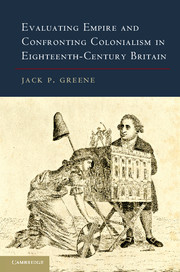Book contents
- Frontmatter
- Contents
- Preface Confronting Empire
- Prologue “Scene of a Foul Transaction”
- 1 “The Principal Cornucopia of Great-Britain's Wealth”
- 2 Outposts of “Loose Vagrant People”
- 3 “A Fabric at Once the Dread and Wonder of the World”
- 4 Arenas of “Asiatic Plunder”
- 5 Sites of Creolean Despotism
- 6 “A Fruitless, Bloody, Wasting War”
- 7 “This Voraginous Gulph of Hibernian Dependence”
- 8 A “Shadow of Our Former Glory”?
- Epilogue “Against Every Principle of Justice, Humanity, and Whatever is Allowed to be Right Among Mankind”
- Index
- References
7 - “This Voraginous Gulph of Hibernian Dependence”
The Languages of Oppression, Corruption, Justice, Liberty, and Humanity and the Identification of Imperial Excesses in Ireland
Published online by Cambridge University Press: 05 June 2013
- Frontmatter
- Contents
- Preface Confronting Empire
- Prologue “Scene of a Foul Transaction”
- 1 “The Principal Cornucopia of Great-Britain's Wealth”
- 2 Outposts of “Loose Vagrant People”
- 3 “A Fabric at Once the Dread and Wonder of the World”
- 4 Arenas of “Asiatic Plunder”
- 5 Sites of Creolean Despotism
- 6 “A Fruitless, Bloody, Wasting War”
- 7 “This Voraginous Gulph of Hibernian Dependence”
- 8 A “Shadow of Our Former Glory”?
- Epilogue “Against Every Principle of Justice, Humanity, and Whatever is Allowed to be Right Among Mankind”
- Index
- References
Summary
“We in Dublin, and you in London, are in the Situation of two Sets of People, who make use of the same Perspective, but at different ends of the Glass,” wrote Hellen O’Roon in a 1754 tract; “we look at you through that Side which magnifies, and presents you nearer much than you really are; and you look at us through the Side which diminishes unreasonably, and throws us at an apparent great Distance.” Distance is the operative word in this remark, and the distance referred to was not physical but cultural. Indeed, members of the Anglo-Irish Protestant Ascendancy that dominated Irish public life following the Glorious Revolution frequently complained that when metropolitans did think about them, they did it in a dismissive way, regarding the Irish, as one anonymous writer said in 1754, as “ignorant and rude, awkward, blunt, and ridiculous; drunkards and cheats; combined to oppose the Government; thorough paced party-men, trained among dogs and horses, bullocks and sheep; where they are likely to lose the little good that nature has put into them.” The language of alterity that metropolitan Britons used in reference to overseas Britons across the Atlantic could also be – and had long been – applied to those residing just across the Irish Sea.
But the use of such pejorative and demeaning language and the perception of cultural distance it implied were always to some extent mitigated by increasingly close connections between Britain and Ireland. As Britain's nearest and oldest overseas possession, Ireland was the site where the English nation had conducted its earliest expansive efforts to expropriate the lands and resources of an indigenous people, turn them to their own use, and replace or override indigenous culture with a transplanted English one. By the eighteenth century, through intermarriage, the Anglo-Irish elite was always to some extent integrated with the English. Irish landlords could be found in both the houses of the British Parliament; Irish-born and educated political figures, such as Edmund Burke, were prominent in British politics; and the metropolitan government was far more deeply and intrusively involved in the public life of Ireland than it was in that of any of the American colonies.
- Type
- Chapter
- Information
- Publisher: Cambridge University PressPrint publication year: 2013



